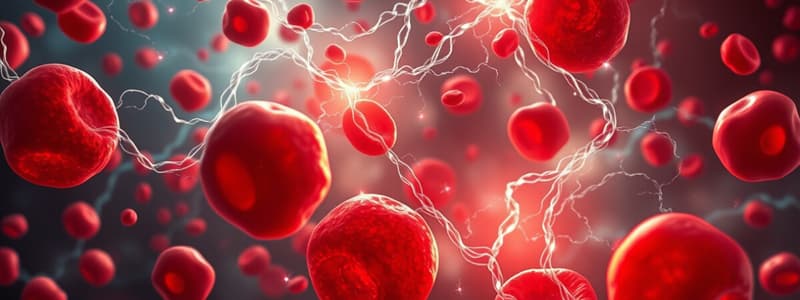Podcast
Questions and Answers
What role does 2,3-bisphosphoglycerate play in relation to hemoglobin?
What role does 2,3-bisphosphoglycerate play in relation to hemoglobin?
- It is crucial for the release of O2 from hemoglobin. (correct)
- It increases the production of ATP during glycolysis.
- It is involved in the phosphorylation of glucose.
- It regulates the conversion of pyruvate to lactate.
What is the consequence of arsenate poisoning on ATP production in glycolysis?
What is the consequence of arsenate poisoning on ATP production in glycolysis?
- It enhances the overall glycolytic pathway efficiency.
- It promotes the conversion of pyruvate to ATP.
- It increases ATP yield through enhanced enzyme activity.
- It bypasses step 7, leading to no net yield of ATP. (correct)
What is the primary role of insulin in glucose transport?
What is the primary role of insulin in glucose transport?
- It decreases the number of GLUT 4 receptors.
- It promotes rapid uptake of glucose by increasing GLUT 4 receptors. (correct)
- It converts glucose to glucose-6-phosphate.
- It inhibits glucose transporters.
Which enzyme is inhibited by glucose-6-phosphate?
Which enzyme is inhibited by glucose-6-phosphate?
Which glucose transporter is primarily found in liver cells?
Which glucose transporter is primarily found in liver cells?
What is the function of the enzyme 2,3-bisphosphoglycerate phosphatase?
What is the function of the enzyme 2,3-bisphosphoglycerate phosphatase?
Which of the following factors activates phosphofructokinase (PFK)?
Which of the following factors activates phosphofructokinase (PFK)?
What happens when fructose-6-phosphate is present in high amounts?
What happens when fructose-6-phosphate is present in high amounts?
In which type of cells are Na+-dependent co-transporters responsible for glucose transport located?
In which type of cells are Na+-dependent co-transporters responsible for glucose transport located?
What inhibits pyruvate kinase?
What inhibits pyruvate kinase?
What is the role of GLUT 4 in glucose regulation?
What is the role of GLUT 4 in glucose regulation?
What is produced when arseno-3-phosphoglycerate is hydrolyzed?
What is produced when arseno-3-phosphoglycerate is hydrolyzed?
Which enzyme converts fructose-6-phosphate to fructose-2,6-bisphosphate?
Which enzyme converts fructose-6-phosphate to fructose-2,6-bisphosphate?
Which GLUT transporters are present in nearly all mammalian cells?
Which GLUT transporters are present in nearly all mammalian cells?
What is the effect of high levels of ATP on phosphofructokinase (PFK)?
What is the effect of high levels of ATP on phosphofructokinase (PFK)?
What happens to ATP production when step 7 of glycolysis is bypassed?
What happens to ATP production when step 7 of glycolysis is bypassed?
Which of the following statements about GLUT transporters is true?
Which of the following statements about GLUT transporters is true?
How does the transport of glucose occur via SGLT1?
How does the transport of glucose occur via SGLT1?
Which of the following is a function of fructose-2,6-bisphosphate in glycolysis regulation?
Which of the following is a function of fructose-2,6-bisphosphate in glycolysis regulation?
What does the presence of citrate indicate in the context of phosphofructokinase activity?
What does the presence of citrate indicate in the context of phosphofructokinase activity?
What is the primary method by which red blood cells generate adenosine triphosphate (ATP)?
What is the primary method by which red blood cells generate adenosine triphosphate (ATP)?
Approximately what percentage of glucose in red blood cells is used to produce 2,3-bisphosphoglycerate (2,3-BPG)?
Approximately what percentage of glucose in red blood cells is used to produce 2,3-bisphosphoglycerate (2,3-BPG)?
What is the function of 2,3-bisphosphoglycerate (2,3-BPG) in red blood cells?
What is the function of 2,3-bisphosphoglycerate (2,3-BPG) in red blood cells?
Which enzyme is responsible for the conversion of 1,3-bisphosphoglycerate to 2,3-bisphosphoglycerate in red blood cells?
Which enzyme is responsible for the conversion of 1,3-bisphosphoglycerate to 2,3-bisphosphoglycerate in red blood cells?
How does red blood cells utilize the oxidative branch of the pentose phosphate pathway (PPP)?
How does red blood cells utilize the oxidative branch of the pentose phosphate pathway (PPP)?
What role does glutathione play in red blood cells?
What role does glutathione play in red blood cells?
What is the overall significance of glycolysis in red blood cells?
What is the overall significance of glycolysis in red blood cells?
Which compound produced in glycolysis interacts with hemoglobin to modulate oxygen affinity?
Which compound produced in glycolysis interacts with hemoglobin to modulate oxygen affinity?
What type of stress do red blood cells counteract using NADPH generated from the pentose phosphate pathway?
What type of stress do red blood cells counteract using NADPH generated from the pentose phosphate pathway?
What is the chemical structure interaction of 2,3-bisphosphoglycerate with hemoglobin?
What is the chemical structure interaction of 2,3-bisphosphoglycerate with hemoglobin?
Flashcards are hidden until you start studying
Study Notes
Glucose Metabolism in Red Blood Cells (RBCs)
- RBCs exclusively utilize glycolysis for ATP production.
- About 25% of glucose metabolized results in the synthesis of 2,3-bisphosphoglycerate (2,3-BPG), crucial for modulating hemoglobin's affinity for oxygen.
- The pentose phosphate pathway (PPP) provides NADPH, essential for maintaining glutathione levels and combatting oxidative stress.
Importance of Glycolysis in RBCs
- 2,3-BPG acts as an allosteric effector that promotes oxygen release from hemoglobin.
- Bisphosphoglycerate mutase catalyzes the conversion of 1,3-bisphosphoglycerate (1,3-BPG) to 2,3-BPG.
- 2,3-BPG can be reversed to 3-phosphoglycerate, re-entering the glycolysis, consequently bypassing ATP production at step 7 while regulating oxygen release.
Arsenate Poisoning Effects
- Arsenate, a phosphorous analogue, replaces phosphate in 1,3-BPG, forming arseno-3-phosphoglycerate.
- This compound hydrolyzes rapidly to 3-phosphoglycerate, leading to the bypassing of the glycolytic ATP-generating step.
- Resulting in no net yield of ATP, which affects energy supply.
Regulation of Glycolysis
- Glucose transport into cells is the initial regulatory step, facilitated by specific transporters (e.g., GLUT family).
- SGLT1 transports glucose via Na+-dependent co-transport in intestine and kidney cells.
- GLUT 1 & GLUT 3 transport glucose across almost all mammalian cells, GLUT 2 is present in the liver, GLUT 4 is found in muscle and adipose tissue and is regulated by insulin, while GLUT 5 and GLUT 7 have specific functions in glucose and glucose-6-phosphate transport.
Key Enzymatic Regulators
- Hexokinase: Inhibited by glucose-6-phosphate; initiates glycolysis by converting glucose to glucose-6-phosphate.
- Phosphofructokinase (PFK):
- Inhibited by elevated ATP and citrate levels.
- Activated by AMP and fructose-2,6-bisphosphate, signaling a need for glycolysis based on substrate availability.
- Pyruvate Kinase:
- Inhibited by ATP, indicating sufficient energy availability.
- Activated by fructose-2,6-bisphosphate, enhancing glycolytic throughput.
Additional Points on PFK Regulation
- High fructose-6-phosphate levels are converted to fructose-2,6-bisphosphate through Phosphofructokinase-2 (PFK-2), promoting glycolysis.
- Presence of fructose-2,6-bisphosphate enhances the glycolytic pathway, while FBPase-2 acts as a counter regulator, influencing the fructose-2,6-bisphosphate levels.
Studying That Suits You
Use AI to generate personalized quizzes and flashcards to suit your learning preferences.




